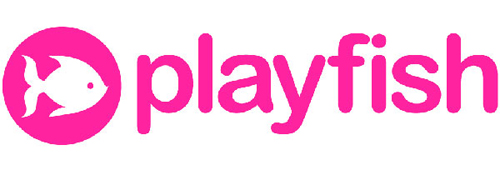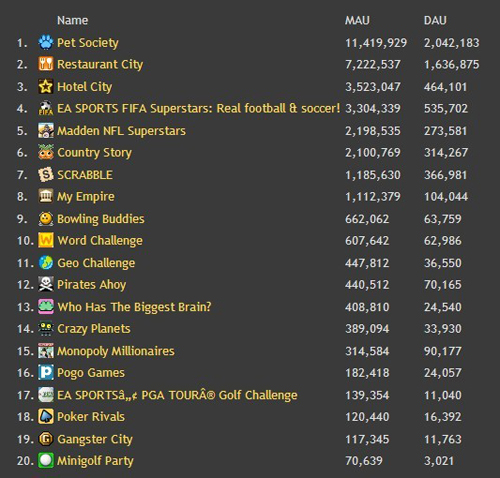Playfish两名联合创始人离职,EA社交游戏前景如何?
2009年美国电子艺界(EA)斥资4亿美元收购社交游戏开发商Playfish一事,引起了业内的高度关注,这意味着传统游戏公司已开始将社交游戏和Facebook平台作为未来的发展方向。去年七月份,迪士尼也紧跟这一潮流,收购了Playdom。此外有许多传统游戏公司,媒体公司以及独立发行者也纷纷涉足这一领域。
Playfish在随后1年多中快速发展,成为EA重要的一部分——但它们之间其实还存在一些问题。EA与Playfish达成交易,很大程度上是因为它们双方都相信,收购能够让各自的热门游戏吸引更多的Facebook游戏玩家。虽然《FIFA》和《Madden》的月活跃用户总数已经超过了500万,但该公司旗下的其他原创游戏却还没有取得突破性的进展。
据游戏邦了解,EA目前已证实Playfish的两位联合创始人——Sebastien de Halleux和Sami Lababidi将会在3月底离职,前者是Playfish的首席运营官,现任EA互动部门副总裁,后者自Playfish成立以来一直领导公司的业务开发和技术运营。不过据EA发言人表示,这两者将继续担任公司的咨询顾问。
游戏邦认为,公司被收购后,联合创始人离职是一个很普遍的现象。不过这两者离去后,EA公司内部就只剩下一名Playfish的联合创始人了,即现任的Playfish总经理Kristian Segerstale。还有一名联合创始人是Shukri Shammas,据他在LinkedIn网站的资料显示,他在去年3月份就离开了公司,在Playfish被收购前,他一直是该公司首席财务总监,之后还担任过一小段时间的高级行政事务主管。
EA和Playfish认为,这项收购交易很大程度上是为了更好地处理游戏知识产权问题。Playfish将向Facebook用户推广EA现有的游戏,创造新的经典作品。那么目前的成果究竟如何呢?
EA及Playfish社交游戏活跃用户情况
据AppData数据显示,就游戏网络流量而言Playfish依旧保持第二,仅次于Zynga。作为EA在Facebook平台的主要资产,Playfish依靠其3600万左右的月活跃用户,成为Facebook平台的第三大社交游戏开发商。Zynga凭借2亿多的用户继续称雄社交游戏领域,而Crowdstar则以4140万用户排名第二。而从日活跃用户来看(游戏邦注:DAU这个参数可以更好地衡量社交游戏公司的营收能力),Playfish排在第二,DAU达619万,打败大多数竞争者,但比起Zynga的6010万DAU,还是略逊一筹。
游戏邦发现,当Playfish被收购前,它的MAU是6000万,DAU为1360万。虽然在过去一年,社交游戏公司的营收均大幅增长,但流量却减少了一半。2010年多数Facebook大型游戏开发商均面临着巨大的发展挑战,而许多小型开发商却因细分市场而获得了良好的发展。
Playfish的社交游戏仍然是EA最具价值的运营项目之一,它与EA Mobile和Pogo等游戏业务的营收共达7.5亿美元,成了EA所有业务中的一大亮点。
收购的另一个重要前提是,Playfish将把EA的热门游戏引进社交游戏领域,通过Facebook平台和其他EA游戏进行交叉推广,为EA创造更大的收益。那么这一进展情况如何呢?让我们参照以下的列表。该列表显示了EA旗下包括Playfish作品在内的20款大型游戏在Facebook上的MAU数据。
可以看出,《Pet Society》和《Restaurant City》依旧处于领先地位,这是Facebook上的两款热门模拟类游戏,它们从2009年开始就被不少开发商效仿和复制。同时,EA游戏《FIFA Superstars》和《Madden NFL Superstars》也有较为可观的流量,游戏邦认为这种情况有可能就是EA交叉推广的结果。但这一点其实也很难说,因为Playfish在2010年初发行的原创游戏《Hotel City》是该平台上的第三大热门游戏。
据游戏邦了解,EA/Playfish将来还会通过EA的品牌优势,发行公司的其他新游戏。
不过目前最炙手可热的社交游戏仍然是原创作品。例如,Zynga通过借鉴其他开发商的创意,然后加入自己的游戏设计理念,接着通过交叉推广,大规模的广告宣布,让Zynga游戏成了头号赢家——《FarmVille》和如今的《CityVille》就是最好的例子。
虽然EA现在的市值已达61.2亿美元,但有报道指出Zynga正打算进行新一轮大规模的融资,其身价已高达70亿至100亿美元。
接下来,Playfish还将继续招兵买马,发行更多社交游戏。就Facebook和游戏的交叉推广而言,Playfish目前的表现还不错(迪士尼的《ESPNU College Town 》就是另一明证),但如今多数Playfish始创人已经另谋出路,EA是时候考虑如何进一步发展了。(本文为游戏邦/gamerboom.com编译,转载请注明来源:游戏邦)
Two of Playfish’s Cofounders Are Leaving Their Positions
Electronic Arts’ purchase of social game developer Playfish in late 2009 was a watershed event. The deal, valued at up to $400 million, signaled that traditional gaming companies believed social games and the Facebook platform are a part of their future. Disney followed suit with its acquisition of Playdom last July, and numerous traditional gaming and media companies and individuals have also moved into the industry.
Fast forward more than a year, and Playfish appears to have indeed become a more important part of EA’s portfolio — yet questions remain for it and EA. An important part of the deal was EA’s and Playfish’s belief was that it could bring existing hits to Facebook gamers in a big way, and while efforts like FIFA and Madden have gotten it more than 5 million monthly active users between them, that has not yet happened to the scale of the company’s other original hits.
Meanwhile, EA has confirmed to us that two of Playfish’s cofounders will be leaving at the end of March: Sebastien de Halleux, Playfish’s chief operating officer and now EA Interactive vice president, and Sami Lababidi, who has headed up Playfish’s development and technical operations since the company’s founding. Both will continue to stay on as consultants, according to a company spokesperson.
It is not unusual for the cofounders of an acquired company to leave. But in this case, only one of the four Playfish co-founders will remain after the other two depart – chief executive Kristian Segerstale, now general manager of the company within EA. The fourth, Shukri Shammas, left in March of last year, according to his LinkedIn profile; he’d been the chief financial officer before the acquisition, and the senior director for general and administrative, for a short time afterwards.
When the acquisition was announced, EA and Playfish described it as being to a large degree about intellectual property. Playfish would promote EA’s existing titles to Facebook users, creating new formats for classics. The results, so far, have been mixed.
Value of Existing IP Still Generally Unproven in Social Games
Playfish has retained its spot as the runner-up to Zynga in terms of traffic, according to AppData, our independent tracking service covering Facebook applications and developers. Comprising the main portion of EA Facebook properties, Playfish is currently the third-largest social game developer on the Facebook platform by monthly active users, at around 36 million as of today. Zynga is in first place with 276 million, Crowdstar is in second with 41.4 million. Looking at daily active users — a better metric for estimating how well social gaming companies are able to monetize — Playfish is in second, with 6.19 million DAU. That’s healthily above most other competitors, but still dwarfed by Zynga’s 60.1 million.
Another important point on traffic: when Playfish sold, it had around 60 million MAU and 13.6 million DAU. While social gaming companies have greatly improved monetization in the past year or so, that halving of traffic likely mitigated those successes. As we’ve covered elsewhere, most of the largest developers on Facebook had significant growth challenges in 2010, even as dozens of smaller developers built businesses targeting niche audiences.
Playfish continues to be a valuable part of EA. Combined with other mobile and online properties, including EA Mobile and Pogo, it will help account for fiscal year digital revenues of $750 million — a bright spot in EA’s overall business.
And yet, an important part of the deal’s premise was that Playfish would bring its hit franchises to social gaming, creating an upward spiral of cross-promotion of usage and revenue between
Facebook and the rest of EA’s games. How have they fared? Take a look at the list below. It shows the 20 largest EA games on Facebook, including Playfish and all others, based on MAU.
Pet Society and Restaurant City, formative simulation-game hits on Facebook, that were widely copied by other developers in 2009, are still in the lead. Meanwhile EA titles like EA SPORTS FIFA Superstars and Madden NFL Superstars have gained respectable traffic numbers — it’s possible that these games and others you see on the list have accomplished what EA intended in terms of cross-promotion. But it’s hard to tell. Hotel City, an original-IP title launched by Playfish in early 2010, is instead the third largest on the platform.
It is possible that EA/Playfish will come out with major new titles in the future that utilize EA branding from other parts of the company.
But the most significant new social games today continue to be original works. For example, Zynga has succeeded by iterating on original concepts proven by other developers, then using its owngame-design skill, cross-promotion heft, and large advertising budget to make itself the biggest winner — FarmVille and now CityVille being the quintessential examples.
While EA’s entire market cap is $6.12 billion today, Zynga is reportedly trying to raise more money from investors at a valuation of between $7 billion and $10 billion.
Looking forward, Playfish continues to be busy hiring employees and publishing more games. It has so far done as well as anyone trying to cross-promote games between Facebook and the rest of its properties (Disney’s ESPNU College Town is another solid example), but now EA will need figure out how to continue building on the business now that most of the founders are moving on.(source:Inside Social Games)









































 闽公网安备35020302001549号
闽公网安备35020302001549号